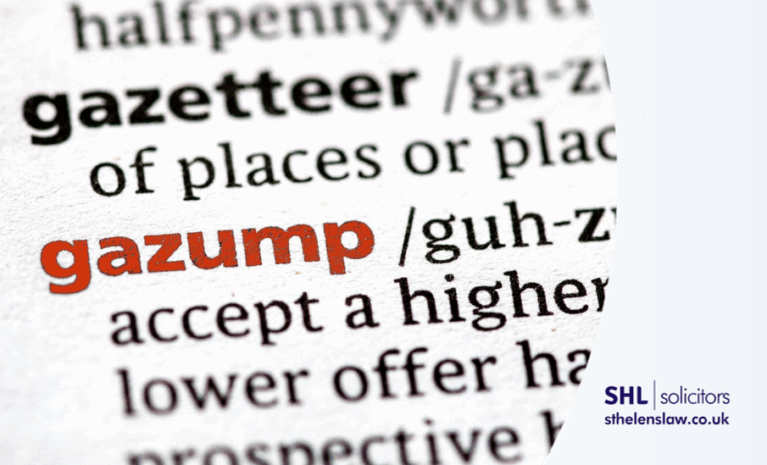Property purchases can be a minefield at the best of times, with over a third of purchases in the UK falling through, according to data from Quick Move Now. There are many variables you need to consider to ensure you get the best value for money and make the right decision.
But what if you were knee-deep in a property purchase, only to have the rug pulled out right from under you without warning? You may be a victim of gazumping.
It’s a funny term, but the consequences are very serious. So, what exactly is gazumping, and is there a way to stop it so you can continue with your property purchase unhindered and without losing cash?
The experts at St Helens Law are here to explain. So keep reading to learn more, or speak to one of our residential property solicitors today if you need assistance with your next property purchase.
What does gazumping mean?
In simple terms, gazumping is where you lose out on a property purchase because someone has offered the seller more than your offer, even though the sale had already been agreed between you both.
Let’s paint a picture: You’ve been on the hunt for a new house for a while and have stumbled across your dream home that meets your family’s needs. Better still, it’s in a desirable area and is within your price range – fantastic!
You head for a viewing and are beyond impressed, so you make an offer. The next day, the estate agent calls you to let you know your offer has been accepted. Even better.
Now, the tricky work in the buying process begins… securing the right mortgage agreement, dealing with the sale of your existing house (if you have one), hiring a reliable conveyancing solicitor, arranging a private survey of your new house, among many other moves that cost time, effort and money.
Weeks down the line, you’ve spent money on all of the above after having an offer accepted, only to be informed the seller has decided to go with a different buyer, because this new buyer beat your offer – this is gazumping.
The result? You’ve wasted weeks, maybe even months, of planning, communication and gathering all the documents to get the purchase across the line, only to fall flat at the final hurdle through no fault of your own. To make matters worse, you’re out of pocket for legal fees, mortgage fees and countless other expenses when the sale falls through.

Is gazumping legal?
Sadly, yes. Gazumping is perfectly legal.
Even if the estate agent takes the property off the market awaiting formal contracts, a property sale in England and Wales is not legally binding until the written contracts have been exchanged. Verbal agreements offer virtually no security in the selling process. This is why you’ll often see ‘SOLD STC’ – meaning ‘Subject to Contract’ – on property listings.
This essentially means a seller accepts an offer, but there is still room for something to happen after the initial agreement that could cause the sale to not meet completion.
How common is gazumping?
According to the Homeowners Alliance, gazumping occurs more than you may think, with 37% of property purchases featuring gazumping in some form.
With the average cost of gazumping at £2,400 per instance, according to the same data, this represents a huge sum of money lost and a lot of disheartened buyers. Which is why so many want to see the practice made illegal.
How to avoid gazumping
Technically, there is no way to ‘avoid’ gazumping and having other buyers bid ahead of you – if contracts have not yet been exchanged and the vendor wants to sell the property to someone else for a better price, that’s their prerogative.
However, there are ways you can protect yourself from the fallout of gazumping:
Home Buyers Protection Insurance
This is a special type of insurance you can take out that will help you recoup some of the costs if you’ve fallen victim to gazumping.
Reach the exchange as quickly as possible
You should never rush a house purchase. After all, there’s so much money and your future happiness riding on it. But reaching the exchange of contracts quicker will reduce the opportunity of others to gazump you. So tread carefully here.
Lock-out agreements
A lock-out agreement is a legal agreement between the buyer and seller of a property, which exclusively promises the sale of said property to a specific buyer, usually for a set period of time.
This is not to be confused with a lock-in agreement, which is also an exclusivity agreement, but it works both ways; both parties involved in the property sale are obligated to negotiate exclusively with each other.
In an ideal world, this is the perfect antidote to gazumping. However, such agreements can be difficult to obtain, due to the required willingness of the seller to limit their options for further gains.
If you believe a lock-out agreement may be of help to you, speak to St Helens Law today.
Can you gazump the gazumper?
Actually, yes! If you wanted to ‘fight dirty’, there’s no law that says you’re not allowed to counter back against your gazumper with a higher offer.
But be mindful of the financial impact. This opens the floodgates to a potential bidding war and could leave you with less cash than you anticipated after the sale.
Or, if we want to start speculating, there’s every chance the seller has asked someone they know to enter a fake offer on their behalf, encouraging you to increase yours. While this technically constitutes fraud, it has been known to happen.

Need advice on gazumping and property law? St Helens Law is here for you
If you are a potential buyer and have been the victim of gazumping, and would like to discuss the situation with a solicitor, St Helens Law has the answers you seek.
Among our top team of conveyancing solicitors in St Helens, you’ll find a team of experienced property law experts who know the rules and regulations of the property purchase process inside and out, and will always offer you the best advice for your specific needs.


